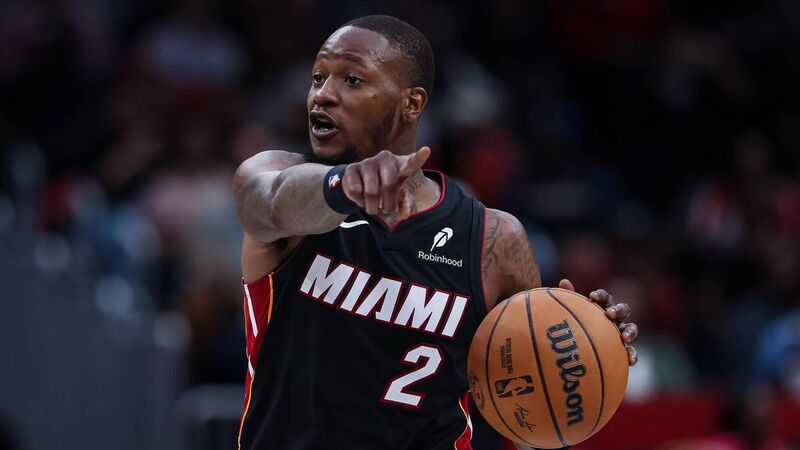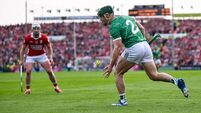Paul Rouse: Don't think game manipulation for gambling couldn't happen here

In the American betting scandal, six people – among them were Terry Rozier (pictured), a current star in the NBA , the Portland Trail Blazers coach Chauncey Billups and Damon Jones, a previous NBA star player and coach – have been charged with using inside information in a scheme to earn millions of dollars in fraudulent bets. Picture: Scott Taetsch/Getty Images
That high-profile sports people in America have been accused of involvement in a betting scandal is not a surprise. Indeed, it is simply a modern twist on an old story.
There is nothing new about the deep links between gambling and sport. This is a relationship that extends around the world and back across the history of competitive sport.
At the same as the American scandal was breaking, an investigation into Turkish soccer revealed that 371 of 571 leading match officials had gambling accounts -152 of those account holders were gambling on a frequent basis. Indeed, more than three dozen of them had placed bets on more than 1,000 football matches each. The most prolific match official had placed a remarkable 18,227 bets on matches.
In the American betting scandal, six people – among them were Terry Rozier, a current star in the NBA , the Portland Trail Blazers coach Chauncey Billups and Damon Jones, a previous NBA star player and coach – have been charged with using inside information in a scheme to earn millions of dollars in fraudulent bets. They were among more than two dozen people alleged to be part of criminal schemes, involving Mafia families (associates of the Bonanno, Gambino, Genovese and Lucchese families were named).
Another former NBA player, Jontay Porter, has actually already entered a guilty plea in what is considered to be part of the same gambling scheme.
The immediate context in which this scandal has unfolded is the decision by the Supreme Court of the United States to allow for legal sports betting. This happened in 2018 when a federal law which banned gambling on sports in most states was struck down.
At the time, the four major professional sports organisations in America – the NBA, the NFL, the NHL and MBA – had argued that the law should not be changed, not least because of the potential threat to the integrity of their sports.
In the way of these things, the people who run these sports organisations quickly accommodated themselves to the new reality and as betting on sport was legalised in state after state, they built partnerships with the gambling companies.
An American sports stadium now is something approaching a giant bookie’s shop. There are ads everywhere, driven by the highest profile athletes, and the capacity to bet on site and on your phone is unlimited.
What has been built in under a decade in America is a multibillion dollar market, where everyone makes money – apart (as studies show) from those who actually gamble. Almost everyone who gambles loses money in the longer run.
One of the great engines of this expansion is what is designated as ‘proposition betting’. This is the betting that relates to events or outcomes within games which may or may not occur – Who will score the first goal? How many red cards will there be? How many fouls by a player? And on and on across the great range of things that happen in the course of every sporting contest.
The key point is that these bets are not on the actual result of the match – rather on what happens within its confines.
To this end, trading inside information is vital. If you know that a player is carrying an injury and will only play a few minutes, you can bet on how little they might score in a basketball match, for example.
Even the outcome of individual pitches in baseball matches stands open for activity. Two Major League pitchers were put on leave during the summer as an investigation was undertaken.
This in-game betting has been vital to the growth in the market and – in consequence – the profits of companies. It is relentlessly advertised.
Studies show that the number of gambling ads that now appear in the middle of matches is now extraordinarily frequent.
A report published this summer showed that ice hockey fans are hit with gambling logos and ads once every 13 seconds during the most high profile matches. In NBA games, there are gambling ads and other references every few minutes.
And a 2023 study of gambling in the Premier League showed that gambling logos appear as often as 3,500 times during a televised match. Central to this are the hoardings that ring every pitch.
It is a simple truth that every year the amount of money gambled on sport in Ireland grows. Securing anything approaching definitive statistics for that precise amount is extremely difficult, but it is understood that Irish people gamble more than €5bn every year.
It is a proven and efficient way to get rid of your money.
The gambling in Ireland extends across the usual global mix of sports – including the NBA.
It is not just professional sport that sees extensive gambling, of course. The GAA at national and local level is a lucrative opening for betting companies.
Those laying bets will be attempting to fuse local knowledge, blind faith, traditional beliefs and more into a decision-making process that is fraught with risk.
In recent weeks, significant sums of money have been gambled on football and hurling county finals around the country.
In any given year, more than two-thirds of county finals are won by fewer than three points. That means a mere kick/puck of the ball between the teams – the margin for error is negligible.
And yet increasing numbers of people pour money out of their pockets on wagers that must often fail.
When the opportunity exists to gamble on particular aspects of the game – ones that are not necessarily likely to dictate the outcome– the potential for manipulation is obvious.
Of course, we could pretend that this could not happen on so sacred an occasion as a county final. Or an All-Ireland final for that matter. Or that an ordinary league game is not glamorous enough to be bothered with.
But we know enough about the insidious hold that gambling takes to recognise that nothing is off-limits.
The threat to the integrity of a contest is undeniable.
Sport depends on the belief that no outcome is pre-ordained, that it is meritocratic, that it cannot be manipulated by outside agencies who dictate a particular outcome.
The problem is that there are now so many moments that can be gambled on that it is wide open to fraud.
And the amount of money to be made offers a great incentive to those who find a way inside a dressingroom, through fair means or foul.
*



